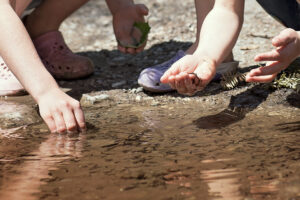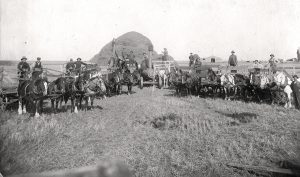By Edith (Dolly) (Milne) McEwen – Lloydminster, Alta.
Three of my brothers worked underground at a mine at Pinto, just south of Bienfait, Sask., during the 1930s. Pinto, which no longer exists, had a small store and post office, and if I remember correctly, a railway station. These little mines diminished after strip mining took over.
I remember the carbide lights the men wore on their mining caps, as they would get them ready to light up in the kitchen at home. They were very smelly and I wondered how they could wear them underground with no fresh air.
They dug the coal out with pick and shovel and loaded it onto a small railcar. A mule pulled to the top entrance and it was loaded into boxcars from there. My brother, Bill, told how he had made a pet out of one mules by giving it tidbits from his lunchbox.
When some of the miners wanted the mule to pull their car out, Bill would have it go and hide. When he got his own car loaded, he’d whistle and the mule would be there to take his load out. They got paid by the cars they loaded, so the other miners didn’t lose anything other than a turn.
No bath or shower facilities
It was a dirty job. There was nothing harder to wash than the clothes they wore. They brought them home for me to wash in an old hand warmer washing machine. I also scrubbed them on the washboard but they never looked clean.
They roomed and boarded in a large boarding house that had a kitchen and a long dining room on the ground floor and one big long room above where they slept. There were no showers or bath facilities. They all slept in this one long room. Some of the men never bathed or changed clothes all winter, so the smell in the room was quite stinky.
The food was poor, cakes were soggy, and they were fed as cheaply as possible. Living and working conditions were very poor. My brothers liked to come home on Sundays for mom’s dinners, and often brought friends along.
Men with families were housed in miners’ camps in small shacks. They were compelled to shop the local stores where they were charged higher prices for everything. They weren’t allowed to shop in nearby Bienfait or Estevan where they could buy cheaper good, or send away to Eaton’s for clothes.
Company town, company store
If they did send out for clothes, they had to pay the store the money they saved by getting it elsewhere. It was reminiscent of Tennessee Ernie Ford’s song: “St. Peter don’t call me I can’t go, I owe my soul to the company store.”
We lived about 15 miles from these mines. My brother, who lived at home, would leave at about 5:00 each morning with team and sleigh and go for a load of coal, getting home at 6 p.m. after a cold hard day. It would take a couple of trips to get our winter supply of coal.
I had an opportunity to tour the underground mine and was glad I didn’t have to work there.
Editor’s note: In 1931, coal miners went on strike for better working conditions. During this strike, a confrontation with police erupted in what came to be known as the Estevan Riot or the Black Tuesday Riot, where three miners were killed.



